FF11
 Story Introduction
Story Introduction
Chocobos, Player Races
Jobs, World Locations
Communication, Trading, Party Organization
Magic, Combat, Skills, Guilds
Crystals, Item Synthesis, Meals, Conquest
Story
The story takes place in a world that mixes swords, magic, and technology on the beautiful planet known as Vana'Diel. In the past this world was blessed by the source of all things in the world, the Crystals. Together with their power, those that believed in the light fought against the monsters that followed darkness. The monsters destroyed the beautiful villages and cities, turning the lands into a vaste wasteland, and the water into deadly pollution.
Eventually, mankind was able to fight back the monsters and regain peace for their land. However, 20 year after the fighting, when people begin to forget the memories of the horrible war with the monsters, the scent of evil once again blows over the land of Vana'Diel. All is resting on the powers of the crystals.
Chocobos
Some things may change, but chocobos are eternal. Final Fantasy XI naturally includes the big yellow birds we've all grown to know and love, although details on their acquisition and use remain a bit unclear. To get a chocobo, you go by the chocobo stable in town (which is marked by a little sign with a chocobo on it -- easy enough), but first you need a chocobo-raising license, which appears to have conditions attached to it. A high enough job level is one, but it isn't the only requirement.
Whatever you have to do, once you have that license and a chocobo, you can go out and run around and hopefully listen to some cool new chocobo music. Chocobos also have the ability to root in the earth for greens, which is useful in a couple of ways. For one, you need to feed your chocobo to keep it happy and healthy. For another, they may dig up a hidden item when looking for food. When you're on soft turf or sand (they can't dig in hard earth), try and see what you can find.
Races
Many different peoples and creatures inhabit the land. Taking a step away from the typical hum/dwarf/elf setup seen in most American RPGs, Square has unveiled the following five different races:
Hume
Tarutaru
Elvaan
Mithra
Galka
 Hume-If they're not exactly called "humans" in the lingo of the world (the katakana in Square's profile omits the "an"), that's more or less what they are. A balanced, middle-of-the-road species, with the ability to acquire many different skills.
Hume-If they're not exactly called "humans" in the lingo of the world (the katakana in Square's profile omits the "an"), that's more or less what they are. A balanced, middle-of-the-road species, with the ability to acquire many different skills.
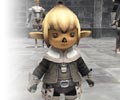 Tarutaru-Cute little suckers, ain't they? And they even look big, if you angle your forced perspective right. These fellows mainly inhabit the Federation of Windurst, where they're very well-known for their magical ability.
Tarutaru-Cute little suckers, ain't they? And they even look big, if you angle your forced perspective right. These fellows mainly inhabit the Federation of Windurst, where they're very well-known for their magical ability.
 Elvaan-Or "elves" if you prefer. The Elven generally make their home in the San D'oria Kingdom, a tall, strong, martial race. They make the best warriors in the game, but their proud nature lends itself to internecine strife.
Elvaan-Or "elves" if you prefer. The Elven generally make their home in the San D'oria Kingdom, a tall, strong, martial race. They make the best warriors in the game, but their proud nature lends itself to internecine strife.
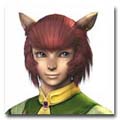 The Mithra
are an elvish race that inhabit a small corner of the Federation of Windurst. They're opposed to the development of science and technology, preferring to remain closer to nature and rely on their innate physical abilities. They have tails and large pointed ears. Male Mithra are extremely rare, and only females ever venture into the outside world.
The Mithra
are an elvish race that inhabit a small corner of the Federation of Windurst. They're opposed to the development of science and technology, preferring to remain closer to nature and rely on their innate physical abilities. They have tails and large pointed ears. Male Mithra are extremely rare, and only females ever venture into the outside world.
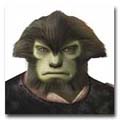 Galka-They're the tall, broad-shouldered creatures we've seen in earlier screenshots. As their build suggests, they're powerful and durable, which suits them well to the industrial life of the Bastok Republic. Galka, curiously enough, don't pass on many common physical traits to their descendants -- instead, they all look fairly different.
Galka-They're the tall, broad-shouldered creatures we've seen in earlier screenshots. As their build suggests, they're powerful and durable, which suits them well to the industrial life of the Bastok Republic. Galka, curiously enough, don't pass on many common physical traits to their descendants -- instead, they all look fairly different.
There will also be other player character races, some of which have a distinctly towering quality (presumably something along ogreish lines).
Jobs
FFXI employs a Job system similar to that seen in Final Fantasy V and Final Fantasy Tactics. When you create a character, you pick a Job, or class, which defines its look, general characteristics, and special abilities. Six jobs are available from the very start of the game, but it looks as if characters can expand into other jobs as they develop, including jobs that aren't available at the beginning. They also gain new special attacks and abilities at certain levels, which can be used once every two game hours. The big six, as it were, are as follows:
Warrior
Specializes in physical attacks, adept in hand-to-hand combat with a wide variety of weapons. Warriors are tough, strong, can use most of the game's more powerful weapons, and develop special abilities geared towards enhancing their attacks and those of others.
Level 1: Mighty Strike, which allows the user to deliver critical hits while the attack is active.
Level 5: Provocation, the ability to make an enemy attack you.
Level 15: Berserker, which raises attack power at the cost of lowered defense.
Level 25: Defensive, the inverse of Berserker, raising defense at the cost of attack power.
Level 35: War Cry, which raises the attack power of nearby allies.
Monk
A martial artist (remember the Black Belt from the first game?) with powerful unarmed combat abilities. Monks, like their forebears, are relatively weak in the early going, but develop into strong fighters once they gain their powerful multiple attack abilities.
Level 1: Hyakka-reppuu-ken. Or something like that. Hard to translate this one, but in practical terms it increases the power and frequency of attacks while active.
Level 5: Tameru, which substantially increases the power of a single blow.
Level 15: Evasion, which increases the monk's ability to dodge attacks.
Level 25: Concentration, which increases hit probability.
Level 35: Chakra, a self-healing ability.
White Mage
White Mages, the ones in the nice white robes with the cute red triangle accents, are skilled in healing and support magics. They only learn one special ability, but they also develop a wide library of white magic spells.
Level 1: Blessing of God, which heals all allies within its range.
Black Mage
Black Mages get things cooking with powerful attack spells and curses, and look plenty snappy in their dark robes and cool pointy hats (if you look around, you may find some shots of Tarutaru mages dressed up just like Vivi from FFIX). Like white mages, they get just one special ability to complement their grimoires.
Level 1: Whirlpool of Magic, which allows spellcasting with no MP expenditure for a time.
Red Mage
Red Mages haven't been seen in the FF series for a dog's age, but fans might remember them as the all-purpose spellcasters from the first game. They can cast both white and black magic spells, and have better combat abilities than their fellows, but the highest level spells are denied to them, and they're a little slower to cast than specialist mages.
Level 1: Continuous Magic, which shortens the mage's casting time for its duration.
Thief
Thieves are stealthy, quick, and agile, compensating for their lesser physical strength with superior evasive maneuvers and sneaky tactics. And what would a thief be without the ability to steal stuff? It's not certain whether you can steal from other players, but don't count on it.
Level 1: Complete Evasion, allowing the thief to dodge all attacks for a time.
Level 5: Steal, the ability to steal items held by an enemy.
Level 15: Surprise Attack, a sneaky backstab that deals major damage to an enemy that doesn't spot the thief.
Level 25: Escape, which kicks up the thief's speed for a time, enabling a quick getaway.
Level 35: Pickpocket, like Steal, except it nicks an opponent's gold.
Bard
On the count of three, everyone make a "spoony bard" joke. One...two...three! Got it out of your system now? Good. Bards are a blend of magician and musician, using instruments and songs to create magical effects. They can learn different songs to cast different "spells," which also vary according to the musical instruments they equip (flutes, harps, and so on). They have two special skills announced so far:
Song Effectiveness: Increases the power of songs during its duration.
Etude of Enchanting: The bard sings and plays to produce a mysterious effect.
Beastmaster
A job with a touch less precedent in the series, the Beastmaster adopts certain monsters, training them to help out in battle. The skill is called "ayatsuru" in Japanese, which translates to something like "manipulate," as with a marionette or puppet. The Beastmaster uses the skill on a target creature, and if it succeeds, they fall under the player's control. When a monster is successfully under the player's command, they have one skill so far:
Fight: "Tatakae," to be precise -- it's a command ordering the monster to fight. This is among a few other commands (presumably "heel," "fetch" and the like) found in the Pet Command window, which opens while a monster is under the player's command.
Dark Knight
The Dark Knight is a warrior allied with the powers of, well, darkness. They possess certain supernatural skills in addtion to some of the special fighting abilities also used by the warrior class, including the ability to absorb damage. That's the one announced job skill:
Blade Weapon: It seems as if this ought to translate to "Bleed Weapon." While active, it allows the Dark Knight to absorb the damage he deals to adjacent enemies as extra HP.
Paladin
The Paladin is the flip side of the Dark Knight, a warrior allied with the powers of good and right and all that other nice stuff. While the Dark Knight is a little more offensively inclined, the Paladin's strengths are more defensive in nature -- in particular, they excel at the handling of a shield. They have one special skill so far:
Heavenly Shield: This magical abilty creates a very pretty shield around the paladin, granting temporary invulnerability.
Ranger
Rangers are skilled in woodcraft and such, but their most useful ability in FFXI is their ranged attack skills -- they're experts at kyuujutsu, or archery in English. They have an unusually high hit rate, and can cause status effects with special shots. That's their one announced skill:
Shadow Attack: If this shot lands successfully, the target is afflicted with the Paralysis status ailment.
Brand New Bag
As in FFV or FF Tactics, it's possible for a character to switch jobs in order to develop a broader range of special abilities. A character switching to a new job retains the special skills developed in their progression through the previous job, although they otherwise take on the characteristics of the new job. There are some immediate penalties to deal with, though, so changing jobs should be a well-considered decision.
Changing jobs is performed at the Mog House. When you want to change jobs, go there and select the "job change" command, as well as the new job. All equipment will be lost in the change (since gear used by one job will be unsuitable for another), so have a garage sale or something before you swap. It may also be necessary to undergo a quest in order to enter the new job. Once that's all taken care of, you set the previous job as the "support job" under the current job. Support jobs are valued at half the level they reached as the primary job, so a level 20 warrior who switches to the white mage job is able to use the special skills acquired up through level 10.
Places To Go
The three primary player races inhabit three major nations: the Republic of Bastok, the Federation of Windurst and the Kingdom of San D'oria.
The world of Vana'Diel is more or less at peace, and peoples from all three can travel freely where they'd like to go, but tension between the countries does exist now and again.
Republic of Bastok
 The Humes or humans or whatever you're meant to call them raised up this nation with their advanced technology and special natural resources. The capital city grew up around a mine where the metal Mithril can be found -- it soon became a center of craft and research.
The Humes or humans or whatever you're meant to call them raised up this nation with their advanced technology and special natural resources. The capital city grew up around a mine where the metal Mithril can be found -- it soon became a center of craft and research.
Federation of Windurst
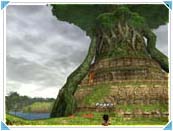 This is a nation cobbled together out of many disparate Tarutaru tribes. Their magical powers have raised up huge, organic cities, seeming to blend naturally with the environment around them, where the Tarutaru continually refine and develop their magical abilities.
This is a nation cobbled together out of many disparate Tarutaru tribes. Their magical powers have raised up huge, organic cities, seeming to blend naturally with the environment around them, where the Tarutaru continually refine and develop their magical abilities.
Kingdom of San D'oria
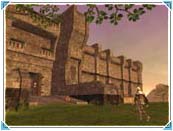 The homeland of the Elvaan rose up in fragile unity after a protracted civil war -- it holds together for now, but the presence of so much pride and violence continually threatens to break down order. The capital city is kept strong by the alliance between the royal knights and their religious counterparts.
The homeland of the Elvaan rose up in fragile unity after a protracted civil war -- it holds together for now, but the presence of so much pride and violence continually threatens to break down order. The capital city is kept strong by the alliance between the royal knights and their religious counterparts.
Ronfaure Forest
The forest area close to the San D'oria Kingdom which contains a huge variety of beautiful green scenery. It's surrounded by a certain mysterious atmosphere.
Gustaberg
An area of barren space surrounding the Bastok Republic. No plants lives here...only the dried rotten husks of trees and rocks remain standing. To the north are caves that yield a wealth of minerals.
Sarutabaruta
A wide plain located to the north of the Windurst Federation. Here and there are plants that are unique to this area. In addition, various monsters, large and small, live in this area as well.
Grand Duchy of Jueno
Jueno is a young nation situated at a strategic point between two of Vana Diel's continents, which are joined by a structure called "Heaven's Bridge." It's neutral to the ongoing power struggle between the three other main nations, preferring to make money off of trade with all and sundry. Its towns are occupied by people of many different races and trades, although the hume and goblin races predominate.
Sanctuary!
Whichever nation players choose as their home, they'll have a place to hang their hat. Each major city has a residential area, marked on the city map, where you can go to relax, regain HP and MP, and store items for future use in the "Mog House." No Mogs are shown in screenshots so far, but evidently they have something to do with the establishments. Mog Houses contain traders and shops that sell useful items, so head there when you need to stock up. They're also where you go to change your job.
Final Fantasy XI is the first game in the FF series that is completely online, of course, with many characters simultaneously coexisting in one online world. Through the second reality created through the magic of massively multiplayer persistent worlds, players can meet various people and together with them go on adventures. In Vana Dir, a vast variety of different peoples exist. One of the races of Humans, is a race that is balanced in various kinds of abilities. Of course there are many other kinds of races and people with different kinds of abilities for the player to chose the one that fits them the most. Humans have both male and female variations, too, so the choices aren't limited to just the race -- there are other, finer options.
The first thing a player needs to do when he/she starts a new game is "create" his or her own character. Because everything from the race, looks, body type, and so on can be set to the player's wish, it is possible to create a unique original character. This is one of the biggest points of FFXI, the ability to create your own Final Fantasy character. The Job System (from Final Fantasy V and Final Fantasy Tactics) allows a remarkable degree of breadth to the skills and abilities you can give your alter ego.
Communication
Communication is taken care of through a simple, easy to understand system. Everything from getting help on how to continue in the game, trading unwanted items, who to fight with, you can talk to anyone you want through a easy system of word inputs, like the icon-based communication in Phantasy Star Online. For more detailed conversations, though, it's also possible to type messages into the chat window with a USB keyboard. There are several channels by which players can communicate, but they should all be familiar to players of other online RPGs:
Say: This spreads your message to other players in your immediate area -- normal real-life speaking distance.
Shout: Louder than Say, the Shout command communicates to players in a broader range. This isn't a MUD-style global Shout, though, heard throughout the entire game.
Tell: This sends a message to a single targeted character on your screen. If they're not visible, though, it looks like it won't work -- you're not telepathic, after all.
Link Shell: Unless you get a Link Shell item, that is. Details are scarce here, but it looks like the Link Shell allows characters to group together and communicate across long distances
Party: Communication between party members is possible without other nearby players listening in, if you're interested in a little conspiratorial confabulation.
Nonverbal communication is also possible through commands analogous to old MUD social or emote commands. Typing a back-slash symbol, followed by certain verbs and occasionally an argument, causes a player character to perform various animations to convey emotions, opinions, and information. Here's the selection:
/bow: Bow politely to another player.
/point: Point at another player -- "I choose you!"
/salute: Salute a superior or other figure of respect.
/kneel: Kneel before Zod!
/laugh: If someone cracks a good joke, reply appropriately.
/cry: Weep over some tragic occurrence.
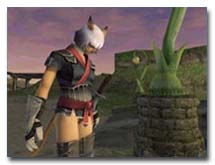
/no: Shake your head negatively.
/nod, /yes: Nod your head positively.
/welcome: Greet an acquaintance.
/joy: Jump for joy, or otherwise express happiness.
/cheer: Root for the home team.
/praise: Give someone some positive reinforcement.
/smile: Hey, there's facial animation.
/poke: Get someone's attention, or maybe pick a fight.
/slap: Definitely pick a fight.
/stagger: "He will stagger and babble when questioned!"
/clap: Put your hands together.
/comfort: Comfort someone in need.
/surprised: Express, well, surprise.
/farewell, /goodbye: Wave goodbye.
 /wave: Wave in acknowledgement.
/wave: Wave in acknowledgement.
/grin: And the Lord did grin...
/dance: Boogie down!
/think: Put on your thinking cap.
/fume: Exude exasperation.
/doubt: "No, I don't think so."
/sigh: Sadness, regret, disappointment, u-pick-'em.
/amaze: See above, except it's amazement.
/stare: Give someone the evil eye.
/blush: Hey, no flirting in public!
/angry: Spread a little negativity around.
/disgusted, /upset: Spread some more.
/muted: Purse your lips in silence.
/doze: Stretch and catch some winks.
/panic: Run around like a headless chicken.
/sulk: Sit in the corner and be petulant.
Trading
 Commerce is the main reason to communicate with strangers in FFXI -- if they've got something you want, and you've got something they want, you can barter between yourselves. This is accomplished with the Trade commands. If you select another character, it's possible to initiate trading. If they agree to negotiate a deal, two inventory windows come up listing each player's respective possessions. Select what you want to give and receive, and if both players agree to the deal, the exchange is executed.
Commerce is the main reason to communicate with strangers in FFXI -- if they've got something you want, and you've got something they want, you can barter between yourselves. This is accomplished with the Trade commands. If you select another character, it's possible to initiate trading. If they agree to negotiate a deal, two inventory windows come up listing each player's respective possessions. Select what you want to give and receive, and if both players agree to the deal, the exchange is executed.
Groups
If you're interested in a more permanent association than a simple business deal, though, that's possible as well. Characters will of course want to join together -- the essential appeal of an online RPG lies the possibility for interaction and group effort. FFXI looks like it will offer a chance for a much larger scale of such efforts than Phantasy Star Online.
Party
You can show others that you want to join in a party by going into the Menu and select the Join Party option. This will cause the Join Party icon to show up beside the character's name allowing other to know that you wish to join a party. Not only can you show you wish to join a group, you can also invite others to join your group. The control is the same as showing your wish to join a party, except instead of the Join Party option you chose the Invite to Party command. This way, a party will be formed with the inviter as the leader of this party. From this point on, the party will do as the Party Leader commands with groups that can have up to 6 members.
Parties converse among themselves via the log window at the bottom of the screen. The Leader is marked in the main field window with a special yellow sign, indicating who to talk to if you want to join up. When it comes to the all-important issue of dividing up treasure, there are two rules -- it's possible to either automatically divide booty or save it in a pool for later division. If disputes arise, Square recommends that those who wish to leave the party "refrain from selfish action as much as possible" and secure the assent of other members before doing so.
Alliance
The alliance system is one that must be considered if you're going to fight against very powerful enemies. It allows multiple parties to form alliances with each other. For those enemies where they're impossible to defeat with just one party, this Alliance system will allow the chance for victory to drastically increase. Alliance will allow up to 3 parties to join together, so up to 18 players can join together. To allow for easy understanding, the Alliance Leader will be indicated with a white mark, to differentiate him from the sub-leaders with their yellow mark.
Combat
Many of the people in Final Fantasy XI are your friends. Many more, and many things which are not necessarily people, are not your friends. Thus, it will be necessary to kill them and steal their stuff -- this, after all, is the way of the world in RPGs. Combat in Final Fantasy XI is nothing like the systems employed in the older Final Fantasy games, but it probably won't be too difficult for players of other online RPGs to grasp. It's a semi-realtime system, blending immediate action with a variety of limitations necessitated by the persistent online environment.
Targeting And Attacking
 When a monster comes into range, you can use an examine command to size up its abilities. If it looks like a vulnerable enough target, lock on and get things happening. Targeting is activated with the press of a key. This highlights the active target in the game window and brings up sub-windows featuring the target's statistics and possible actions for attacking it -- physical attack, magic, item use, defense, and so on.
When a monster comes into range, you can use an examine command to size up its abilities. If it looks like a vulnerable enough target, lock on and get things happening. Targeting is activated with the press of a key. This highlights the active target in the game window and brings up sub-windows featuring the target's statistics and possible actions for attacking it -- physical attack, magic, item use, defense, and so on.
Once physical attacks are selected, the player character attacks automatically at intervals determined by its statistics. Fast characters can attack more frequently, of course, so it behooves players to train their agility stats. The tempo of attacks is also affected by what kind of weapon is equipped -- a two-handed sword, say, isn't quite so nimble as a dagger, although it naturally hits harder when it does land. When attacking, remember that you don't have to whack the attack key repeatedly. In fact, you definitely don't want to do that. Once an attack is activated, the attack key becomes the attack cancel key, which releases the target lock and allows the attacker to flee. Releasing the lock in this way also broadcasts a call for help to the general vicinity.
Ranged attacks can be initiated without melee combat going on at the same time. Using ranged weapons is relatively simple -- equip a weapon in one slot, ammunition in the other, and select "ranged attack" from the action window. This brings up an indicator to select from the various targets in range, and confirming the target selection initiates the attack. Of course, ranged attacks won't work when melee combat is engaged, so it's important to keep one's distance and attack quickly, before an enemy can close in.
Magic
Magic, like physical attacks, functions in real time when doing battle in FFXI. Each spell has the usual cost in magic points, as well as a casting time, during which the spellcaster is relatively defenseless (unless his buddies are pitching in), and as in many RPGs, it's possible for casting to be disrupted if an enemy attacks during that time. Thus, it's important for a spellcaster to develop their evasion abilities, and a few heavily-armed associates might help as well. Casting time is indicated by a meter to one side of the screen, and varies according to the spell being cast. More powerful spells demand a longer setup time, although that can be reduced by improving the appropriate magic skill.
Magic
Magic in Final Fantasy XI is divided into the same two schools as it is in any other game in the series (providing you don't count the curious Blue Magic of Final Fantasy IX and others). White mages cast white magic, black mages cast black magic, and red mages use a smattering of both disciplines. All mages learn spells the same way, though, by purchasing scrolls and memorizing the spells contained therein. Here's a list of all the announced spells employed by mages of all types (although only specialists can use the highest levels). More should be added later, though -- many Final Fantasy staples are obviously missing from these lists.
Black Magic
Fire 1: Deals elementary damage with a fire attribute to one target.
Blizzard 1: Deals elementary damage with an ice attribute to one target.
Aero 1: Deals elementary damage with a wind attribute to one target.
Stone 1: Deals elementary damage with an earth attribute to one target -- no petrification effect.
Thunder 1: Deals elementary damage with a thunder attribute to one target.
Water 1: Deals elementary damage with a water attribute to one target.
Fire 1 G: Deals elementary damage with a fire attribute to a group of targets.
Blizzard 1 G: Deals elementary damage with an ice attribute to a group of targets.
Aero 1 G: Deals elementary damage with a wind attribute to a group of targets.
Stone 1 G: Deals elementary damage with an earth attribute to a group of targets.
Thunder 1 G: Deals elementary damage with a thunder attribute to a group of targets.
Water 1 G: Deals elementary damage with a water attribute to a group of targets.
Poison 1: Afflicts an enemy with a mild poison, dealing continuous damage.
Venom 1: Afflicts an enemy with a moderate poison, dealing more continuous damage.
Bio 1: Afflicts an enemy with a severe poison, dealing the maximum continuous damage and lowering its attack power.
Sleep: Puts an enemy to sleep.
Darkness: Blinds an enemy, reducing its chance to hit.
Stop: Paralyzes an enemy, preventing it from attacking.
Dungeon: Warps the caster and party out of a dungeon and back to safety.
White Magic
Cure 1: Restores the HP of a single ally.
Cure 1 G: Restores the HP of a group of allies.
Raise 1: Brings a single dead ally back to life.
Poisona: Cures the poisoned condition of a single ally.
Parana: Removes the paralysis condition from a single ally.
Lidark: Cures the darkness condition of a single ally.
Vocal: Removes the silence condition from a single ally.
Dia 1: Deals gradual light damage to a single enemy and lowers their defense power.
Dia 1 S: Deals gradual light damage to a group of enemies and lowers their defense power.
Banish 1: Deals a blow of light power to a single enemy.
Banish 1G: Deals a blow of light power to a group of enemies.
Protect 1: Protects a single ally from physical attack.
Shell 1: Protects a single ally from magical attack.
Blink: Blinds an opponent, making it easy to evade their attacks.
Stoneskin: Stops a certain amount of damage from every attack.
Aquaveil: Lowers the probability of a magic attack being interrupted.
Slow: Decreases the frequency of an opponent's attacks.
Haste: Increases the frequency of an ally's attacks.
Hold: Paralyzes an opponent, preventing any action.
Silence: Stops an opponent from casting magic spells.
Skills
In addition to the special skills each job picks up, characters can and must learn ordinary skills in order to get by in the world of Vana'Diel. These cover basic combat and magic abilities, making it easier to dodge, deal damage, cast spells, and the like. At each step up in level, a character gets a chance to raise certain skills of their choice. This is a rundown of the announced skills as yet:
Weapons
Players must become proficient with a particular type of weapon in order to use it effectively in combat. The higher a particular weapon skill, the better a character's hit percentage and damage bonus with that weapon will be. Conversely, a character with a low weapon skill won't do very well when forced to use that type of weapon in a pinch. Listed weapon types so far include: unarmed combat, daggers, one-handed swords, one-handed axes, and one-handed clubs.
Tactical Points serve as a reward for using the weapons with which a player is skilled. Inflicting damage upon an enemy thus adds to the Tactical Point gauge, which goes up through 100% all the way to a potential 300%. These points are expended to perform special attacks, weapon techniques specific to a particular weapon skill or weapon group that are learned through use of those weapons. The TP gauge decreases over time, when a player isn't fighting, so continuous combat is necessary to use weapon skills on a regular basis.
Evasion
Evasion is the ability to dodge an opponent's attack, especially important for lightly-armored and agile thieves. The higher the evasion skill and corresponding statistics, the more likely the chance of a dodge.
Shield
Equipping a shield lends itself to a better passive defense, but the higher a warrior's shield skill, the more likely it is they'll also be able to actively block an opponent's attack and take no damage whatsoever.
Parry
Parry is similar to shield, but it only requires the equipment of a weapon to get a shot at blocking attacks. Shield may be assumed to be a little more effective, although the type of weapon equipped should affect the usefulness of the Parry skill.
Magic
Like weapons, different types of magic also require skill proficiency to increase their effectiveness. Mages, and non-mages who happen to have a magical profession as their support job, must study different categories of magic to use the spells contained therein. There are six types of magic: holy magic (general white magic spells), recovery magic (cure and status removal spells), support magic (defensive spells), weakness magic (black spells such as Poison), spirit magic (black attack spells), and dark magic (darkness and a few other black spells).
Synthesis
Finally, there are skills for item synthesis -- check for a full discussion of that subject in the section about Crystals.
Guilds
Guilds are tradesman's organizations built around specific synthesis skills. Joining a guild (which doesn't appear to be too strenuous an effort) allows access to its various services, which are helpful in several ways. First, going to the guild and training is required to raise the level of an associated skill. Guilds also offer more direct assistance in certain tasks. When attempting a difficult item synthesis, you can go to the guild and get help from an expert, which increases the chances of success. Finally, guilds also maintain shops that sell items they make, or raw materials for making those items yourself. The FFXI site lists the following guilds so far:
Culinarians' Guild: That's Square's language, not ours. If your vocabulary is not so mighty, "culinarian" means "cook." This guild thus pursues the art of preparing delicate and tasty foods (which is more useful a skill than you might think -- look elsewhere for the rundown on food).
Blacksmiths' Guild: Blacksmiths forge swords, armor, and tools from base metals. The best swords are found in San D'oria, although Bastok has more advanced technology in general, perhaps even including firearms.
Boneworkers' Guild: Exactly what it sounds like, workmen who craft items out of bone. What items they might be remains a bit unclear.
Fishermens' Guild: Fishermen teach the art of, well, fishing, as well as the crafting of tools useful for that purpose. And they'll probably sell you some tasty fish, too.
Carpenters' Guild: Woodworkers run this guild, which appears to mainly be devoted to large-scale building and joining projects.
Crystals
One of FFXI's many throwbacks to the early roots of the series is the focus on "Crystals," crystalline objects that contain the life force of the world. These are the game's Macguffin, the widget that everyone is after. Control of the Crystals amounts to control of corresponding bits of the world, and since all three major nations have expansion on their minds, the adventurers of each nation are roaming far and wide in search of Crystals to expand the power and territory of their homelands.
Crystals can be found in the monster-filled wild lands of each country. Areas where adventurers travel are ringed by border guards installed by the government of the nation that lays claim to that territory in order to aid their countrymen. From the border guards, you receive a "signet," which is an enchantment that makes it easier to find crystals or pick them up from fallen bad guys. The enchantment wears off after a little while, though, so it's wise to get those crystals while the getting is good.
Crystal Types
There are eight types of crystals, each corresponding to a particular natural energy and related attribute. Here, handily illustrated, are the crystals.








Each crystal has its opposite, easily discerned from the listing above, and each elemental energy also has a particular quality that describes the manner in which it might prove useful. Fire embodies combustion; water embodies dissolution; earth embodies joining; wind embodies separation; ice embodies coagulation; thunder embodies decomposition; light is the force of reproduction; darkness is rot and decay. Is this all poetic silliness? Not quite.
Item Synthesis
All these different qualities play a role in the business of manufacturing items, one of the areas in which Final Fantasy XI seems to borrow from the latter-day FFs. The key to creating magical weapons, armor, and other objects is unlocking the different energies contained within the crystals. For this, you need crystals, raw material, and the following synthesis skills:
Blacksmith: Crafting metal goods like weapons, armor, and tools.
Sewing: Creating cloth goods -- hats, capes, and other apparel.
Alchemy: Brewing up potions and other chemical concoctions.
Woodwork: Working wood (duh), so as to make musical instruments, shields, furniture, and so on.
Jewelry: Finely working metal and jewels into rings and amulets.
Tanning: Turning animal hides into clothes, shoes, belts, and vellum for scrolls.
Gaining levels in item synthesis accords a character more impressive titles in their chosen trade, and more importantly, it reduces the chance of costly failure in item synthesis. That's important, because the crystals and other raw materials necessary to make powerful items may take a fair amount of effort. The actual business of synthesis is relatively simple -- once all the items are collected, all you need is a place to cook. Mix the materials together, add the appropriate crystal as a catalyst, and if luck is with you, presto! A new magical or otherwise useful item. Maybe you can keep it for yourself, but one of the main reasons to specialize in a trade, naturally, is to use your products to engage in commerce with others.
Meals
Final Fantasy XI's world progresses in real (albeit accelerated) time, so every so often players will have to stop and eat something. Going too long without food or water results in gradual penalties to a character's status. Conversely, certain foods can also have a beneficial, or at least unusual effect on a character. Square offers a couple of interesting examples on the FFXI site -- apparently a meal high in protein increases strength and poison resistance at a cost in intelligence, while fish benefit agility and paralysis resistance while lowering magical capability. Go figure.
Some food effects are immediate, while others are latent and must be brought out through cooking. Thus, if you want to get the most out of your meals, develop your cooking skills.
Conquest
So here's a question. What is there to do in this big, wide world of Vana'Diel? Sure, wandering around and killing things is fun for a while, but it gets a little thin after a while with no overarching goal to give it purpose. That purpose, in theory, is provided by Conquest, the continuing rush by the three nations of the world to grab hold of as much territory in the neutral wilds as possible. After all, while no state of open war exists, there's still no point in standing idly by while the other guy grabs a bigger slice of the pie than you do.
The world map is marked with different flag icons in each region, indicating who controls that area. Each of the three countries has its own icon, and then there's a neutral black icon, representing unclaimed wilds. If you'd like to claim some glory for your home country, not to mention yourself, form a party and go out to try and plant the flag in a monster-controlled region. Clearing an area of monsters earns conquest points for your country, and the country with the most conquest points controls that particular region. Every week, in game time, the points are toted up and regions change hands accordingly. The monsters are a player in this phase as well -- if the player death rate in a particular region is more than 10% (i.e., 10% of the players from all countries that go in don't come out alive), that area reverts to neutrality.
Anybody can pass through or do battle in an area presently controlled by another country -- player-killing is not allowed in FFXI, so competition doesn't lead to direct conflict between adventurers from rival nations. However, there is still a direct incentive to control territory. As noted in the section discussing Crystals, adventurers traveling in a region controlled by their country also get an advantage in Crystal acquisistion, in the form of signet enchantments from their border guards.
And that is it...for now. Look forward to much more coverage of Final Fantasy XI as soon as we can translate it, hunt it down, dig it out of the beta, or otherwise suck it up and spew it out in your direction. Thank you for your patience and stay tuned for more information.
Back to top